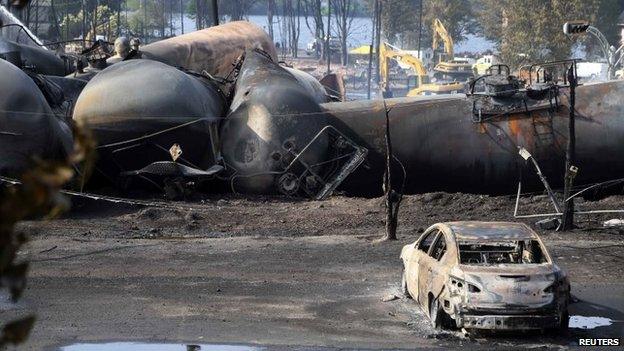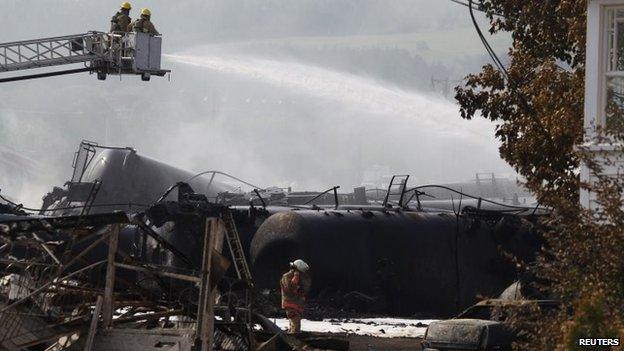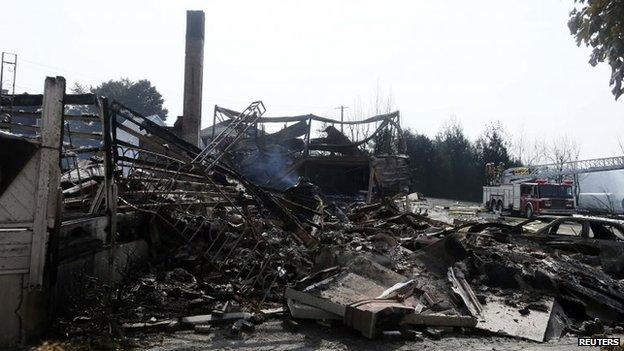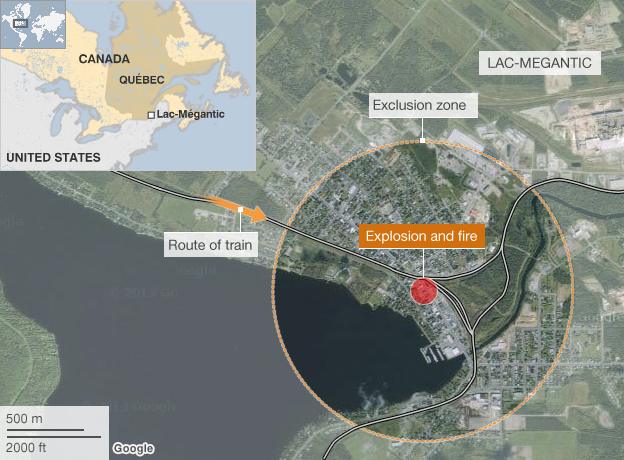Canada runaway train: Lac-Megantic death toll rises
- Published
Eyewitnesses say the streets "were filled with fire"
Another two bodies have been found after a runaway train carrying crude oil exploded in the Canadian town of Lac-Megantic, police say.
The death toll from Saturday's blast stands at five; there are fears it will rise further as 40 people are missing.
PM Stephen Harper said the affected area looked like a war-zone.
The pre-dawn explosion sent a fireball and black smoke into the air, destroying dozens of buildings and forcing the evacuation of 2,000 people.
"It's a difficult to explain what's happened here... a large part of the down-town has been destroyed," said Mr Harper after touring Lac-Megantic.
He said some 30 buildings had been incinerated in the historic centre of the town, which is some 250km (155 miles) east of Montreal.
He promised a full inquiry, but said it was too early to allocate blame for the disaster.
"There'll be investigations to ascertain what happened and to ensure it never happens again," said Mr Harper.
Police are trying to account for dozens of missing people - popular bars near the blast site were said to have been crowded at the time.
"There are about 40 people, more or less, who are considered to be missing," police spokesman Michel Brunet told reporters. "There could be more, there could be less."
Police said earlier they expected the death toll to rise, but were checking whether people reported missing were simply away on holiday.
'It's a mess'
Two of five cars that exploded were still ablaze nearly 36 hours later, Lac-Megantic Fire Chief Denis Lauzon told reporters on Sunday morning.
Firefighters have been battling the flames with water and a fire retardant, but are staying at least 1,000 ft from the burning tankers for fear of more blasts, he added.
About 30 buildings - including some of the town's most historic structures - were obliterated by the blast.
"We lost the bibliotheque [library] which had all the memories of people here - it's a mess," said Chief Lauzon.
The five bodies found are so charred they have been sent to Montreal for identification, police say.
The fires have been so intense and have burnt for so long that Quebec police warn some bodies may never be recovered.
People whose homes have been badly damaged are being sheltered at a nearby school.

One witness said the fireball that followed the derailment was "like an atomic bomb"

Two of five cars that exploded were still ablaze nearly 36 hours later

About 30 buildings - including some of the town's most historic structures - were obliterated by the blast

People whose homes have been badly damaged are being sheltered at a nearby school

Prayers were said for victims of the disaster during Mass services in the surrounding area
'Like an atom bomb'
The train's 73 cars carrying pressurised containers of crude oil reportedly uncoupled from five locomotive engines parked outside the town around 01:00 (06:00 BST) on Saturday, gathering speed as they rolled down the tracks before derailing in Lac-Megantic.
Eyewitnesses said that by the time the cars reached the town they were travelling at considerable speed.
Fire Chief Denis Lauzon: "We still have a risk of explosions as we still have tankers on fire"
Bernard Demers, who runs a restaurant near the blast site, said the fireball that followed the derailment was "like an atomic bomb", the Sunday Telegraph reported.
A one-kilometre exclusion zone was set up amid fears of more pressurised containers exploding.
The Montreal, Maine & Atlantic train was parked in the village of Nantes - about 7km (four miles) from Lac-Megantic - during an overnight driver shift-change, said a company spokesman.
A driver had parked the train and put the brakes of its engines on "properly" before going to a local hotel for the night, said the spokesman, Joe McGonigle.
But the fuel cars somehow became uncoupled, causing them to roll downhill into the town and derail, he added.
The train was carrying the crude oil from the Bakken Field in North Dakota. Montreal, Maine & Atlantic owns more than 800km (500 miles) of track serving Maine, Vermont, Quebec and New Brunswick.
A lakeside town that is home to some 6,000 people, Lac-Megantic is close to the US border with Maine and Vermont, and is 130 miles north of Maine's capital, Augusta.
